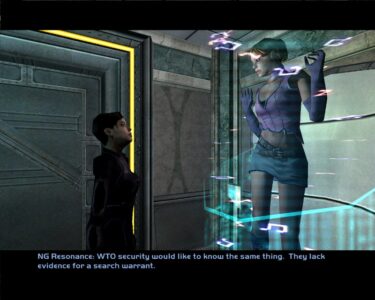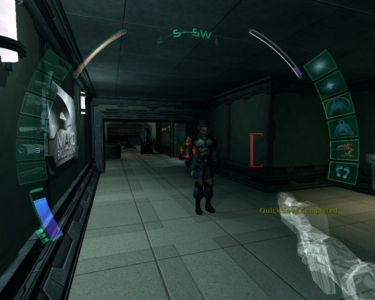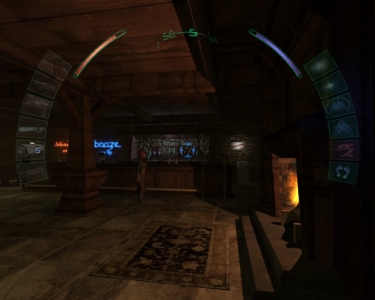
Deus Ex: Invisible War
Written by: Stoo
Date posted: February 17, 2010
- Genre: RPG
- Developed by: Ion Storm
- Published by: Eidos
- Year released: 2004
- Our score: 7
Ion Storm’s 2001 title Deus Ex remains a top-rated favourite here at FFG, and was widely hailed as one of the true classics of PC gaming. Taking an innovative blend of traditional gaming genres, it handled like a first-person shooter but incorporated RPG elements like character skills. This allowed it greater depth than a straight shooter along with freeform approach to problem solving. Action fans could kick the front door down, and sneaky types could creep in through the sewers. All of this in richly detailed and interactive environments.
It was also known for being a landmark event in the development in intelligent storytelling in PC gaming, as a truly gripping scif-fi thriller. Set in a dystopian mid 21st century, it showed us a world of advanced technolgy but also fear, crime and civil unrest. We took on the role of one (gravelly voiced, badass) man on a mission to uncover the truth about shadowy organisations that were manipulating world events. The narrative gleefully drew on popular conspiracy theories, but also drew on themes like the extent of government surveillance, the gaps between powerful elites and the rest of us, and the balance between our need for order and liberty.
So Deus Ex was well-written and implemented a game that believe it or not, even Rik’s finished it. And his interest in anything with “RPG” written on is usually on a par with his enthusiasm for interpretive dance or basket weaving.
All good games demand a sequel, so we fans were quite excited when one was announced. On the downside, it was announced for consoles too and because we’re all awful snobs the words Dumbing Down buzzed fearfully in our consciousness. On the plus side Warren Spector was involved again – that is the chap responsible for the original game, and he’d also been involved the earlier seminal System Shock, about which I’ll bang on for ages if allowed. In other words, he knows his stuff when it came to immersive, involving first-person experiences that can keep you hunched in front of a monitor in a dark room until 1am.
So then here’s Deus Ex: Invisible War. Try not to be put off by the hero holding his gun gangsta-style sideways on the box. This also marks our first review of a 2004 game – our definition of “old” tends to work in respect to the present day rather than a fixed period in time. If it’ll run on a crappy computer 6 years older than the current standard, we’re interested. Don’t worry, we won’t be flooding the site with content that recent, but a sequel to a much loved classic is a great place to start.
So anyway, the setting is about twenty years after the first game, so sometime late in this century. Following the events of Deus Ex the world plunged into war and depression, an event known as the great collapse (the plot seems to merge elements of all three endings to the original). Now society embarking on a long slow climb back upwards. An organisation called the WTO has set about building sheltered enclaves in major cities, in which monitored capitalism is allowing progress and prosperity for a lucky few. Everyone else is stuck outside enduring poverty, crime and occasional nanotechnology plagues, hoping to get their shot at the opportunities the enclaves offer. Meanwhile a church known as the Order, formed from a merger of pretty much all major religions, warns of the dangers of the free market. They believe its unrestrained greed to have been a cause of the world being in such a crappy state today.
You take on the role of Alex D who can be male or female (clever trick with the name, as seen in Elite Force). You’re a student of an academy that produces highly skilled mercenaries, with added biotech enhancements, to provide security for major corporations. Except things start going pretty badly wrong from the moment you start playing. Your home city is destroyed in a terrorist atrocity, you’re sent to another facility in Seattle, but then that comes under attack too. Amidst the chaos some worrying allegations are fired off by agents of the Order. They claim that you were in fact being used as a test subject by some other shady group, with various nanotechnology fiddling going under the guise of what was supposed to be routine performance-enhancing biomods.

The holographic pop star is strangely interested in matters such as local crime and corruption.
Once the dust has settled – with the “tutorial” sections taking place amidst the attack on your academy – you’re left standing in the Seattle enclave with a desire to learn what the hell is going on. Who wanted you dead, and where did that scientist in charge of the experiments go? You need some answers.
So what we launch into here is what I reckon to be a highly worthy continuation of the Deus Ex story. You might recall that one had a choice of three endings; this one sort of merges them together, takes that situation and then sensibly develops it. Society has changed in the aftermath of the collapse, and technology has moved on also. It’s all a bit more scifi, but in a plausible manner, with factors like nanotech introduced in the original having simply become more widespread.
At the start of the game you’re choosing missions – possible conflicting in goals – with the WTO and the Order. As you continue your hunt for the truth, though, you’ll find that the situation is rather more complicated than just the WTO and Order badmouthing each other. Old global conspiracy groups live on in new forms and manipulate events from the shadows. Anti-technology fanatics are growing in strength and… remember JC Denton? He was last seen merging with an Artificial intelligence before the collapse. Now he’s got some new ideas about how to lead humankind out of darkness.
He may have been the hero of the first game of course but, that doesn’t mean you have to agree with him. Again we’re given competing factions, all with a plan on how to pull on the world’s strings, and you must by the end choose the one you think will serve humanity best. There’s no definitive answer as to who’s right, no obvious good guys. Part of the experience is learning about the factions and their wildly different philosophies, pondering the implications and reaching your own conclusion.
One aspect is a little different this time. The original had one clear group of villains that you couldn’t side with, they were just obvious megalomaniacs. Now everyone’s supposed to be potentially sympathetic and a potential choice. On this count it doesn’t work so well, as one group came across as such a load of rabid fanatics, there’s not much incentive to give their point of view a fair chance. So picking them felt like deliberately siding with bad guys.
Aside from that though, the narrative does a pretty good job of presenting conflicting agendas with arguments for and against each, that touch on some interesting issues of society and technology. Can powerful elites be trusted to steer a path towards happiness and prosperity for all, even if it takes a while? How much control over, and information about our lives, should they hold? Do we desire instead perfect equality and if so how drastic a change to our own natures are we willing to make? What might we sacrifice?
Progression through the story throughout continues to come from the missions missions offered by the various factions. These don’t greatly impact the core narrative, until the very end. However you do get a little more control, compared to the original, over the details of what occurs and in what order. You might have to say, go to a secret weapon lab, whatever happens. But you’ll have different and possibly conflicting objectives in what to do there. They might both be interested in a scientist, one wanting her interrogated and the other killed.
In doing a group’s bidding you might reveal more of their plans. Then again, they might not be telling you the whole truth. Be sure to read every piece of data you come across, and listen to what ever character has to say. Maybe even look to your own conscience a bit. Ultimately you must piece your own opinion together – and be prepared to stop and reconsider a few times along the way.
So anyway, for narrative I reckon it’s a satisfactory follower to the first game so that’s half the battle. For the other side, we should look at how it handles. It’s rendered in the second iteration of the Unreal engine, and while the workings of graphics engines are a bit above us, it’s certainly all quite realistic looking and convincing enough for a six-year old game. Character models are a bit plastic compared to today, but a clear step up from the original Unreal engine. There’s some crazy ragdoll physics going on, so expect indestructible bodies being launched through the air at high speed in a tumble of flailing limbs.
Meanwhile environments are detailed and quite immersive. There’s a great contrast between the plush enclaves – carpets and shiny lights – and the grime of the slums. Major sections take place in Seattle, Cairo and Trier and each has their own distinctive look, and I believe this is the first time I’ve ever stepped foot in a Mosque in a game. Wherever you go, locations are full of detail and interactive features like book excerpts to read, working candy machines and random items to pick up. There might be no point in throwing coffee cups at people, but the option to do so does make it all feel a bit more real.
You’ll find maps are often arranged on a hub basis, with maybe some city streets as the central part leading onto locations with combat and mission objectives. Just like the Hell’s Kitchen or Hong Kong section in the original, it helps keep the chapters of the game feeling cohesive. On the downside, maps are all rather tiny and claustrophobic. It feels like sometimes you only have to run down a couple of corridors, before you’re hit with a wait for the next zone.
To be fair it’s barely a 10 second wait on a modern PC, and anyone really aggrieved by that probably needs to work on their attention span. Still while such small chunks of environment are okay inside say a research base, they do make expansive outdoor areas pretty much out of the question. Also there’s never much opportunity for exploring off the beaten path. I suppose it’s a concession to the memory requirements of the consoles of the day.
While we’re grumbling, many gameplay aspects have been simplified when no-one was asking for them to be. For example, all guns bizarrely all now use the same ammo (and you have to work out for yourself how much a shot from each one uses). Is the difference between shotgun shells and rifle bullets too hard to keep track of? On a similar note electronic hacking tools and lock-picks are now rolled into one. Meanwhile the locational damage system, where hits to arms reduced your accuracy, hits to legs reduced speed etc. is gone also.
Also the whole skills system from the first game has been removed. I mean a concept like higher pistol skill meaning more accuracy and damage, that’s not too complex or clunky surely? It’s not like you needed to flick through a dungeons and dragons rulebook to get the idea. Of course shooters managed fine for years without such a thing – but the RPG hybridisation was part of what gave the original it’s own unique feel.
There is good news still – at least the system of biomod upgrades has survived. This lets you customise your character with various special powers running off an internal energy supply. It might sound like techno-magic but actually presents some rather some fairly sensible ideas for what could happen if you had a zillion microscopic machines inside you. You have several “slots” for mods and three options for each. Like for one, you might be able to choose between computer hacking, invisibility or a summonable scout drone.
Also though the game tries to continue in the tradition of the original, in giving you several options to solving any particular problem. If you’re infiltrating a corporate facility, you could try fighting the guards, or going in through service tunnels vents risking laser-tripwire traps instead. Or maybe trying another direction and tangling with robotic sentries, who bring their own challenges. Or maybe you could just bribe the janitor to let you in the back door, although that’ll cost you cash you would otherwise spend on supplies or biomods.
I found sneaky the best style – the game supports the essentials of stealth play like reduced visibility in the dark and crouched movement being quieter, but also several of the biomods further aid this. I did kind of miss being able to lean though. I mean poking your head around a corner seems quite useful to this whole “not being seen” business.
Okay I’m grumbling again. Even within the sneaky subset anyway, you could try for a few different applications. I settled into a path of devastating surprise attacks but you can try to avoid killing, playing hit and run with non-lethal weapons if you prefer. In fact against tougher foes it’s sometimes easier not to bother picking a fight at all. But you can always just say balls to it and let rip with a hail of fire if you like.
For a final criticism it’s on the short side overall, maybe half the length of the original. I mentioned the cramped maps – and it’s not like there’s a vast amount of them either. The narrative seems sufficiently complete by itself, but sometimes advancing it just involves a fairly brief (even if fun) jaunt to a rather small secret lab. I appreciate we’re meant to be grownups now with less free time… but eh, who am I kidding. I wouldn’t have minded a few hours more play here, even just on side-quests and rooting around.
So let’s sum up. There are clearly ways in which Invisible War is lacking compared to it’s predecessor. It’s short on content and streamlined in ways it didn’t need to be. So it’s lost part of the depth and detail that made the original so compelling. The map size we could probably pin on console limitations but otherwise it’s a matter of misguided design choices. Deus Ex wasn’t perfect (we hold that no game is), but slimming it down like this was not the path to making it ever greater.
However, it’s far from a total loss. This one does still have some of the key qualities that made Deus Ex a classic. There’s plenty of atmosphere, intriguing characters and a compelling story. It even manages to be a bit less linear than the first time around. Also it retains at least part of the flexibility in gameplay. So the end result is hardly some mundane shooter. Rather it’s an intelligent thriller that draws you into its world and pushes you to consider your actions carefully, and think about the role you play.
This is a game we approached with high expectations. So we can’t help being a little disappointed, and shouldn’t disregard how it falls short of what could have been. Keeping some perspective though, it’s still a highly worthwhile experience. So our final verdict is, if not top marks, still a heartfelt recommendation over many other lesser shooters.




 Posts
Posts
I came into this game really wanting to like it and I came out underwhelmed. Ironically, for me the main problems of the game were not the dumbing down – it was the presentation and the technical side. The engine in this one is pretty bad. It feels slippery and unreliable. The character models are a mixed bag – most are pretty serviceable, but some, like Male!Alex could really use some work – he looks like a complete doofus. And sounds like one too – the marketing materials make him look like a hip bold dude with a ‘tude snarky and cocky badass, but the voice acting is so_goshdarn_dull. Jay Anthony Franke, the voice of JC managed to give the middle Denton a voice that’s kinda monotone, but still you can kinda hear the emotion through it and it’s alive and it’s not dull (in contrast to his more lively and emotional senior brother). Whoever voiced Male!Alex made him completely boring. But I do dig his attire though.
The level designs are okay, but going between the levels is such a drag. I really wish there was a mod that just sews the levels together.
August 27, 2014 @ 11:54 pm
I guess there’s a trick to sounding deadpan without being totally flat and dull. Although JC does have one or two bad moments of his own (“a bomb!”).
Re: sewing levels together, I believe fans have recently done just that with Thief 3, which was from around the same time and using the same engine. So maybe this one will get similar treatment eventually.
September 4, 2014 @ 11:03 am
He does, but most of the game still has him right, whereas Alex.. isn’t.
I really hope for that, that’d improve the game.
September 4, 2014 @ 11:27 pm
Oh yeah, I mean, the delivery of his lines is one of the reasons JC is one of our all time favourite heroes.
September 5, 2014 @ 8:46 am